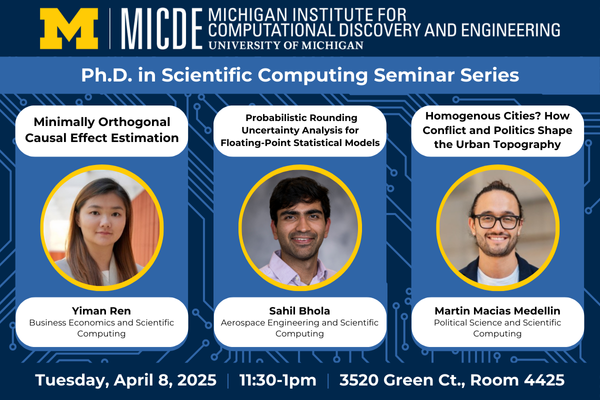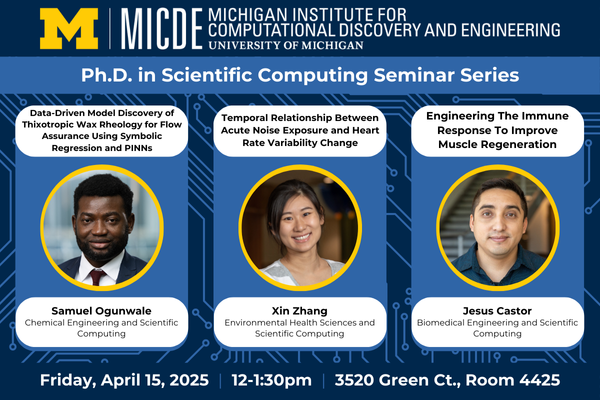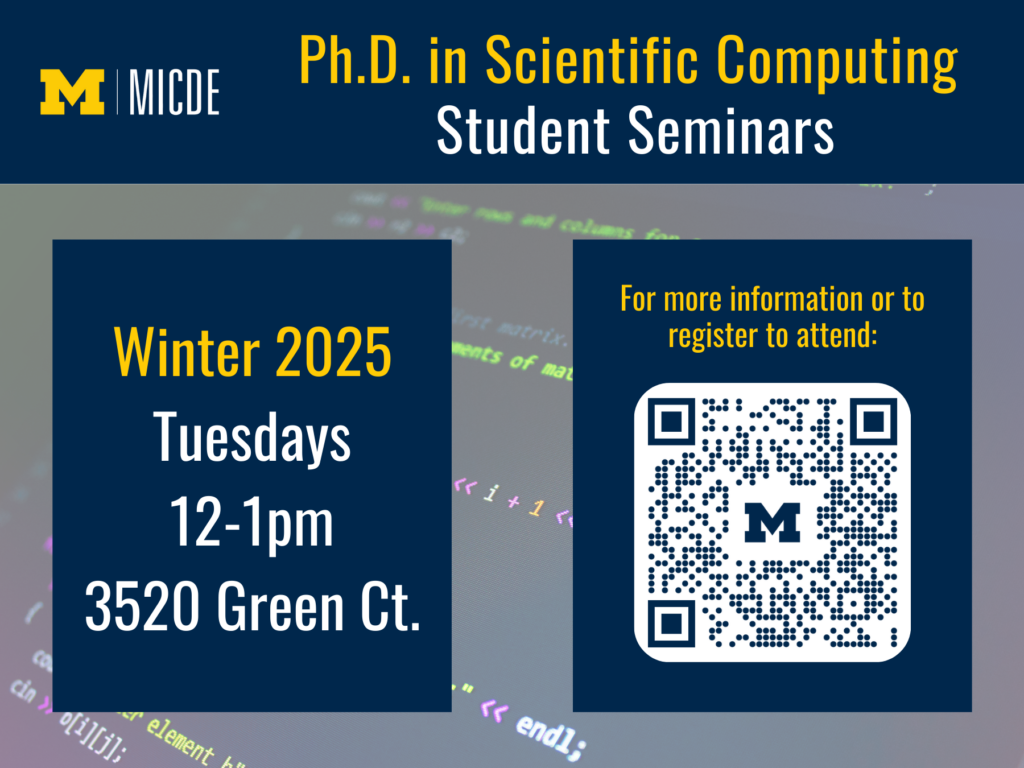Events

- This event has passed.
Ph.D. in Scientific Computing Student Seminars
February 11 @ 12:00 pm - 1:00 pm
Venue: 4th floor conference room, Green Ct.

The MICDE PhD Student Seminar Series showcases the research of students in the Ph.D. in Scientific Computing. These events are open to the public, but we request that all who plan to attend register in advance.
If you have any questions, please email micde-phd@umich.edu.
Adaptive Deep Learning-Powered Multi-fidelity Stratified Sampling for Efficient Failure Analysis of Nonlinear Dynamic Systems
Current stochastic simulation-based frameworks that leverage variance reduction techniques still require a substantial number of model evaluations to estimate small failure probabilities associated with rare events. In the context of high-fidelity modeling environments, these frameworks can become computationally challenging, especially when dealing with complex nonlinear systems. Despite the potential of providing remarkable computational efficiency, low-fidelity models may yield bias if used directly. To address this challenge, this work introduces a multi-fidelity framework within the setting of stratified sampling, termed Multi-Fidelity Stratified Sampling (MFSS), for efficient estimation of failure probabilities given various limit states of interest. In this approach, the strata-wise failure probabilities, associated with a carefully selected stratification variable, are estimated by multi-fidelity Monte Carlo. To minimize the computational budget, the high-fidelity data used in the stratified multi-fidelity estimator is also employed as training data for developing a deep learning-based metamodel, which then serves as a low-fidelity model. To derive the trade-off between the approximation quality and computational demand associated with the metamodel, an adaptive strategy is proposed to seek the minimal training data that ensures a desired correlation between the high- and low-fidelity models. Through application to a full-scale high-rise steel building subject to stochastic wind excitation, the proposed scheme is demonstrated to be capable of accurately reproducing exceedance probability curves of nonlinear responses of interest with significant computational gains, compared to variance reduction techniques relying solely on high-fidelity models.
Liuyun Xu (Civil Engineering and Scientific Computing)
Liuyun Xu is a fourth-year Ph.D. candidate in Civil Engineering and Scientific Computing at the University of Michigan. Her research lies in enhancing the resilience and adaptation of civil infrastructures against climate-related hazards by leveraging AI/ML, scientific computing and data science.
A Hybrid Surrogate Modeling Framework for Digital Twins of Nuclear Energy Systems
Nuclear Power Plants (NPPs) are complex systems that can benefit from Digital Twin (DT) technologies to reduce operational costs and increase plant reliability. A system surrogate model is developed to predict quantities and responses associated with diverse physical and computational assets. The proposed hybrid surrogate modeling framework is applied to a Pebble-Bed Fluoride-salt-cooled High-temperature Reactor (PB-FHR), with a two-loop reactor configuration. The surrogate’s hybrid design combines the accuracy of physical models and computational efficiency of data-driven models to achieve speed and predictive robustness. This surrogate model is adaptable through assimilation with online measurements, which is highlighted in a proposed DT framework design.
Jasmin Lim (Aerospace Engineering and Scientific Computing)
Jasmin is a 5th PhD student in the department of aerospace engineering in the Computational Aerosciences Laboratory under the advisement of Karthik Duraisamy. Her research is focused on developing data-driven methods for digital twin applications; which includes surrogate modeling, data assimilation, and system framework design.


